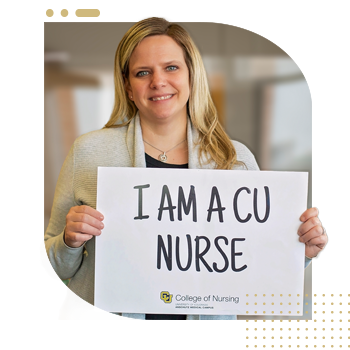BS to Doctor of Nursing Practice
Acute Care Pediatric Nurse Practitioner
You can advance your career by earning both a Master of Science and a Doctor of Nursing Practice (DNP) degree back-to-back. In this program, you’ll earn an MS Acute Care Pediatric Nurse Practitioner degree and become an Advanced Practice Registered Nurse (APRN). Then, you’ll pursue your Doctor of Nursing Practice (DNP) degree.
This program prepares you to care for children who are typically healthy but are seeing you because they’re sick. You’ll help manage short-term but serious health conditions, like a respiratory illness or injury.

Overview
Format
Hybrid online
Mostly online with some in-person requirements on the CU Anschutz Campus in Aurora, CO.
Avg. time to complete
5 years
13 semesters
Exam prep
AC-PNP
When you finish the program, you can sit for the Acute Care Pediatric Nurse Practitioner (AC-PNP) exam to become board-certified.
Apply once, earn two degrees
You only apply once to this program. You'll earn a master's degree and a doctoral degree back-to-back without needing to apply to each program separately.
Clinical placements set up for you
If you’re in Denver or Aurora, we arrange clinical placements for you. We work with some of the top clinics and hospitals in the area like Children’s Hospital Colorado and the Rocky Mountain Hospital for Children.
Expert faculty dedicated to your success
Many of our faculty are recognized locally and nationally for their excellence in nursing, education, and research. Our educators are passionate about helping students advance their knowledge and careers.
#1
Doctor of Nursing Practice program in Colorado*
Highest
ranking MS in Nursing program in Colorado*
Career
Once you finish the BS to DNP Acute Care Pediatric Nurse Practitioner program, you can take the board certification exam through the American Nurses Credentialing Center. After passing the exam, you'll be ready to get your license, unlocking a new career path and scope of practice. Acute care pediatric nurse practitioners can get licensed to work in all 50 states, including Colorado.
What you can do
- Prescribe medication
- Serve as an independent provider
- Assess, diagnose, and treat health conditions
- Educate patients about health management and disease prevention
Who you can care for
Children of all ages, from newborns to young adults
Where you can work
- Hospitals
- Family clinics
Why get a Doctor of Nursing Practice degree?
A Doctor of Nursing Practice (DNP) degree prepares you for leadership, advanced clinical practice, and healthcare policy roles. You'll learn about evidence-based practice, quality improvement, and healthcare systems management. Unlike a PhD in Nursing, which is more research-focused, a DNP is geared towards applying your skills in a clinical setting.
Admissions
Deadline(s)
| Start term | Application opens | Priority deadlinetooltip | Extended deadlinetooltip |
| Fall 2026 | August 15, 2025 | January 15, 2026 | April 1, 2026 |
Get started
1
Check the requirements
Understand the admissions requirements like how many letters of recommendation you need and what courses should be on your transcript.
2
Start your application
Work on your application and submit it through NursingCAS.
Curriculum
Hands-on training
This program places you in a clinical setting for 1,125 hours. We set up your clinical experiences if you’re in the Denver Metro.
In-depth coursework
You’ll learn in 51 classroom-based credit hours. Your classes will cover topics like pediatric advanced clinical skills and evidence-based practice.
Students enrolling for Fall 2026
Students enrolling prior to Fall 2026
Skills and knowledge you'll gain
Costs
| Residency status | Estimated total tuition** |
| Colorado residents | $60,876 |
| Eligible western state residents** | $60,876 |
| Nonresidents | $98,648 |
| Additional expenses | Time frame | Estimated costs |
| Matriculation fee | One-time | $140 |
| Other fees | By term | Fall $349, Spring $349, Summer $349 |
| Books and supplies | Total for program | $2,000 |
| CU health insurance (may be waived with proof of comparable personal health insurance) | By term | Fall $2,742, Spring $3,838, Summer $1,095 |

![]()
I earned my undergraduate degree... through the University of Cincinnati, which is set up similar to [the CU Anschutz Campus], where there's a children's hospital close by. So, I knew that I was going to get that same kind of relationship between CU Anschutz Nursing and Children's Hospital Colorado, where I work.
Lindsey Harms, MSN, CCRN
CU Anschutz Nursing Alum
MS Acute Care Pediatric Nurse Practitioner program
Become the nurse practitioner looked to first 
Get your degree from the top nursing college in Colorado. Start your journey to become a CU nurse today.